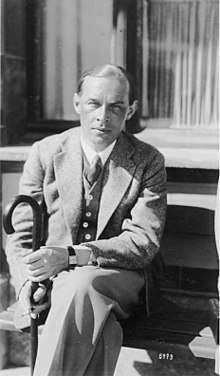
A hospital alone shows what war is.
Erich Maria Remarque (22 June 1898 – 25 September 1970), born Erich Paul Remark, was a German novelist who created many works about the horrors of war, most famous for his novel All Quiet on the Western Front.
Quotes
- Aber das ist wohl so, weil ein einzelner immer der Tod ist — und zwei Millionen immer nur eine Statistik.
- The death of one man is a just death, the death of two millions is a statistic.
- Der schwarze Obelisk (1956)
- A variant of this quote "One death is a tragedy. A million deaths is just a statistic." has also been attributed to Joseph Stalin, but no source for this has been found. This version appeared in the English press not later than 1958. (Ремарк, Эрих Мария // Словарь современных цитат / составитель К. В. Душенко — Москва: изд-во «Эксмо», 2006)
- The death of one man is a just death, the death of two millions is a statistic.
All Quiet on the Western Front (1929)
- This book is to be neither an accusation nor a confession, and least of all an adventure, for death is not an adventure to those who stand face to face with it. It will try simply to tell of a generation of men who, even though they may have escaped shells, were destroyed by the war.
- Epigraph
- We march up, moody or good-tempered soldiers — we reach the zone where the front begins and become on the instant human animals.
- Ch. 4
- It is just as much a matter of chance that I am still alive as that I might have been hit. In a bomb-proof dugout I might have been smashed to atoms, and in the open survive ten hours' bombardment unscathed. No soldier survives a thousand chances. But every soldier believes in Chance and trusts his luck.
- Ch. 6
- A word of command has made these silent figures our enemies; a word of command might transform them into our friends.
- Paul after visiting Russian prisoners, Ch. 8
- I thought of your hand-grenades, of your bayonet, of your rifle; now I see your wife and your face and our fellowship. Forgive me, comrade. We always see it too late. Why do they never tell us that you are poor devils like us, that your mothers are just as anxious as ours, and that we have the same fear of death, and the same dying and the same agony — Forgive me, comrade; how could you be my enemy?
- Paul to the corpse of a French man he has just killed, Ch. 9
- Tjaden reappears. He is still quite excited and again joins the conversation, wondering just how a war gets started. 'Mostly by one country badly offending another,' answers Albert with a slight air of superiority. Then Tjaden pretends to be obtuse. 'A country? I don't follow. A mountain in Germany cannot offend a mountain in France. Or a river, or a wood, or a field of wheat.' 'Are you really as stupid as that, or are you just pulling my leg?' growls Kropp. 'I don't mean that at all. One people offends the other—' 'Then I haven't any business here at all,' replies Tjaden, 'I don't feel myself offended.' 'Well, let me tell you,' says Albert sourly,' it doesn't apply to tramps like you.' 'Then I can be going home right away,' retorts Tjaden, and we all laugh.
- Ch. 9
- A hospital alone shows what war is.
- Paul after seeing the horrific state of wounded soldiers in a hospital near the front, Ch. 10
- It is very queer that the unhappiness of the world is often brought on by short people. They are so much more energetic and uncompromising than the big fellows.
- No, we are not related. No, we are not related. Do I walk? Have I feet still? I raise my eyes, I let them move round, and turn myself with them, one circle, one circle, and I stand in the midst. All is usual. Only the Militiaman Stanislaus Katczinsky has died. Then I know nothing more.
External links
This article is issued from
Wikiquote.
The text is licensed under Creative
Commons - Attribution - Sharealike.
Additional terms may apply for the media files.
